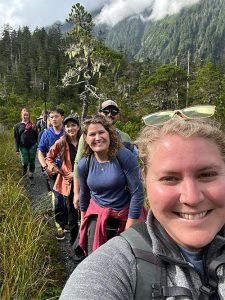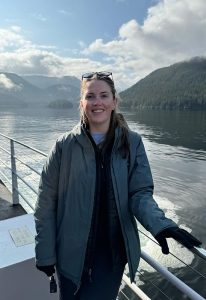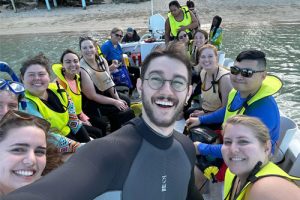Going Beyond the Classroom and Making Lasting Connections
Published January 2, 2025

From different coasts and with differing interests and goals, Paula Ly, Lauryn Freedman, and Maddie Myers embarked on educational journeys that have taken them from Cuba to Costa Rica, the Bahamas to Sitka, Alaska. Yes, the Johns Hopkins University MS in Environmental Sciences and Policy program is offered completely online, but this trio are taking advantage of multiple field study courses before they are expected to graduate in May of 2025. This allows them to experience invaluable, immersive on-site learning supplements to classroom instruction and solidifies their personal choices to be change agents for the planet.
“The field component was the main driver in my decision to enroll in the Johns Hopkins program,” said Ly, a native Californian who holds an undergraduate degree in environmental engineering and currently works as an environmental specialist in contamination and remediation for the Port of Los Angeles. “I wanted a flexible master’s program that I could do part-time, that offered a field component because I still needed to interface with peers and professors. The field courses allow you to learn a lot in a short span of time, to experience cultures and resources first-hand, and to expand your horizons about environmental issues. They were a great way to meet, connect, and network with intellectual people who are focused on the environment.”
In fact, Ly was sold on the benefits of the field study opportunities following her first experience in Costa Rica and its focus on sustainability leadership, where she gained valuable leadership skills that have translated into her work as a project manager. Her next adventure took her Cuba, where she studied the country’s culture, politics, and conservation efforts and snorkeled in its coral reefs. Her third trip brought her to Sitka, Alaska, where she met up with Freedman and Myers to learn more about the natural resources of the area, visited a bear sanctuary, smoked salmon, and connected with the indigenous Alaksa Natives to discuss their subsistence on fishing and hunting and the sustainability efforts that both the state and federal government are making to protect their way of life.
Freedman, who has part-ownership of a family restaurant on the shore of the Atlantic Ocean in Margate, N.J. and an undergraduate biology degree, first completed a field course on the use of drones for environmental monitoring before setting off to the Bahamas to explore coral reefs, caves, blue holes, and ocean life. Her third experience brought her to Alaska, where, among other eye-opening things, she learned about the environmental challenges brought on by the growth of the cruise ship industry in the region.

“These experiences have been so inspiring,” Freedman said. “Scientists, in general, are so passionate about what they do, and it has been great working with people who are interested in problem solving and coming up with the best possible outcomes for environmental challenges. I have learned so much and have met so many like-minded people. My trip to Alaska, in particular, was hugely inspiring to me because I met a lot of people who were scientists, but then they also were artists. I met people who owned a restaurant, but they also were fishermen. They do everything. That was so relatable, because I hope to keep one foot in the restaurant industry and then use my degree to make a difference in the world. This program has given me a whole new perspective, allowed me to pursue something that is meaningful to me, and has inspired me to think about leaning toward the renewable energy field. There is no other program that could have prepared me better than this one.”
Myers, who hails from Downingtown, PA and earned an undergraduate degree in print and digital journalism with a double minor in earth systems and political science, shared similar experiences in the Bahamas and Alaska. Now living in Gaithersburg, MD, and working as a senior proposal writer for a federal contractor with the hopes of transitioning to educational outreach and advocacy for environmental policy reform, she also sings the praises of the field courses as game-changers in her program selection.
“I was drawn to the Johns Hopkins program because it wasn’t just environmental science,” she said. “There was a major focus on policy, and the field courses were an extra bonus. This program has so many course offerings and is entirely tailorable to every area of environmental interest. There are so many pathways for us. This field has so many different branches, and so does the program. The professors have extensive personal, professional, and educational backgrounds, and this shines through in their enthusiasm for the information and insight that they are sharing. They also are so accommodating. I have never encountered a professor who was not understanding of my professional obligations.

“Within an hour of getting to Forfar Field Station on the island of Andros in the Bahamas, we were in the water exploring mangroves, learning about their function in the ecosystem,” Myers continued, “We were snorkeling and documenting which fish and how many we saw and also looking for invasive species, which we saw. We learned about how these species are damaging to coral and to other fish and how that impacts the fishing industry. We got up at 5 a.m. and went birding in a reclaimed industrial park and got to see the regrowth of forests. In Alaska, we explored the people side of environmental science by talking to business and community members, who were so open to discussing the environmental issues that they are experiencing first-hand. The days in the field were often physically and mentally draining, but in the best way.”
All three of the soon-to-be graduates find gratification not only in the successful completion of their Johns Hopkins degrees and the professional advantage it will bring to their chosen fields, but also in knowing that their career choices can be impactful in improving people’s health and quality of life and in making spaces that are more green and sustainable.
“I discovered rigorous and important environmental work at Johns Hopkins and issues that I had never heard of, and I came away with a group of great friends, in all parts of the country, who are amazing and who are going to change the world,” Ly said.
Attention: Students and Alumni
Are you a current AAP student or alumni and want to share your accomplishments?
Interested in pursuing a graduate degree at Johns Hopkins University?
Request information to learn more or apply here.